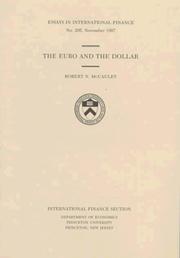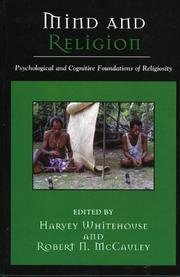| Listing 1 - 10 of 53 | << page >> |
Sort by
|

ISBN: 0881651125 9780881651126 Year: 1997 Volume: 205 Publisher: Princeton (N.J.): Princeton university. Department of economics. International finance section,
Abstract | Keywords | Export | Availability | Bookmark
 Loading...
Loading...Choose an application
- Reference Manager
- EndNote
- RefWorks (Direct export to RefWorks)
International finance --- Portfolio management --- Banks and banking, International --- Euro-dollar market --- Money --- -Portfolio management --- -AA / International- internationaal --- EEC / European Union - EU -Europese Unie - Union Européenne - UE --- US / United States of America - USA - Verenigde Staten - Etats Unis --- 333.453 --- 334.151.25 --- 333.420.0 --- -Money --- -Euro-dollar market --- 332.456094073 --- Investment management --- Investment analysis --- Investments --- Securities --- Currency --- Monetary question --- Money, Primitive --- Specie --- Standard of value --- Exchange --- Finance --- Value --- Banks and banking --- Coinage --- Currency question --- Gold --- Silver --- Silver question --- Wealth --- Eurocurrency market --- Market, Euro-dollar --- Foreign exchange --- International banking --- Offshore banking (Finance) --- Transnational banking --- Financial institutions, International --- International monetary system --- International money --- International economic relations --- Internationale munt. Rekeneenheden. --- Rekeneenheid, gemeenschappelijke munt van de Europese Gemeenschappen. ECU. Euro. --- Theorieën in verband met de keuze van de geldstandaard. Currency substitution. Foreign currency deposits. --- Euro --- AA / International- internationaal --- Theorieën in verband met de keuze van de geldstandaard. Currency substitution. Foreign currency deposits --- Internationale munt. Rekeneenheden --- Rekeneenheid, gemeenschappelijke munt van de Europese Gemeenschappen. ECU. Euro --- Portfolio management - European Union countries --- Money - European Union countries
Book
ISBN: 9780199827268 9780199341542 0199827265 Year: 2013 Publisher: New York, N.Y. Oxford University Press
Abstract | Keywords | Export | Availability | Bookmark
 Loading...
Loading...Choose an application
- Reference Manager
- EndNote
- RefWorks (Direct export to RefWorks)
The battle between religion and science, competing methods of knowing ourselves and our world, has been raging for many centuries. Now scientists themselves are looking at cognitive foundations of religion--and arriving at some surprising conclusions. Over the course of the past two decades, scholars have employed insights gleaned from cognitive science, evolutionary biology, and related disciplines to illuminate the study of religion. In Why Religion is Natural and Science Is Not, Robert N. McCauley, one of the founding fathers of the cognitive science of religion, argues that our minds are better suited to religious belief than to scientific inquiry. Drawing on the latest research and illustrating his argument with commonsense examples, McCauley argues that religion has existed for many thousands of years in every society because the kinds of explanations it provides are precisely the kinds that come naturally to human minds. Science, on the other hand, is a much more recent and rare development because it reaches radical conclusions and requires a kind of abstract thinking that only arises consistently under very specific social conditions. Religion makes intuitive sense to us, while science requires a lot of work. McCauley then draws out the larger implications of these findings. The naturalness of religion, he suggests, means that science poses no real threat to it, while the unnaturalness of science puts it in a surprisingly precarious position. Rigorously argued and elegantly written, this provocative book will appeal to anyone interested in the ongoing debate between religion and science, and in the nature and workings of the human mind.--Book jacket.
Philosophy of science --- Religious studies --- Psychology of religion --- Religious psychology --- Cognition and culture --- Psychology, Religious --- Religion and science --- 159.9:2 --- 215 --- Christianity and science --- Geology --- Geology and religion --- Science --- Science and religion --- Religion --- Religions --- Psychology and religion --- Culture and cognition --- Cognition --- Culture --- Ethnophilosophy --- Ethnopsychology --- Socialization --- 159.9:2 Godsdienstpsychologie --- Godsdienstpsychologie --- Godsdienst en wetenschap --- Religious aspects --- Psychological aspects --- Psychology --- Religion and science. --- Psychology, Religious. --- Cognition and culture. --- Religion et sciences --- Psychologie religieuse --- Cognition et culture
Digital
Year: 1997 Publisher: Basle
Abstract | Keywords | Export | Availability | Bookmark
 Loading...
Loading...Choose an application
- Reference Manager
- EndNote
- RefWorks (Direct export to RefWorks)
Digital
Year: 2012 Publisher: Basle BIS
Abstract | Keywords | Export | Availability | Bookmark
 Loading...
Loading...Choose an application
- Reference Manager
- EndNote
- RefWorks (Direct export to RefWorks)

ISBN: 0631189688 Year: 1996 Publisher: Oxford Blackwell
Abstract | Keywords | Export | Availability | Bookmark
 Loading...
Loading...Choose an application
- Reference Manager
- EndNote
- RefWorks (Direct export to RefWorks)
Cognitive psychology --- Philosophy of science --- Psychiatry --- Churchland, Patricia Smith
Book
Year: 1997 Publisher: Basle Bank For International Settlements. Bis Working Paper Nr. 50
Abstract | Keywords | Export | Availability | Bookmark
 Loading...
Loading...Choose an application
- Reference Manager
- EndNote
- RefWorks (Direct export to RefWorks)
Book
Year: 2012 Publisher: Basel Bank for international settlements - Monetary and Economic Department
Abstract | Keywords | Export | Availability | Bookmark
 Loading...
Loading...Choose an application
- Reference Manager
- EndNote
- RefWorks (Direct export to RefWorks)

ISBN: 0759106185 0759106193 Year: 2005 Publisher: Lanham, MD : AltaMira Press,
Abstract | Keywords | Export | Availability | Bookmark
 Loading...
Loading...Choose an application
- Reference Manager
- EndNote
- RefWorks (Direct export to RefWorks)
Psychology, Religious. --- Psychologie religieuse --- Whitehouse, Harvey. --- Sociology of religion --- Comparative religion
Book
ISBN: 9780190091149 0190091142 0190091177 0190091150 9780190091163 9780190091170 0190091169 Year: 2020 Publisher: New York, NY: Oxford university press,
Abstract | Keywords | Export | Availability | Bookmark
 Loading...
Loading...Choose an application
- Reference Manager
- EndNote
- RefWorks (Direct export to RefWorks)
"McCauley and Graham endorse an Ecumenical Naturalism toward all cognition, which will illuminate the long-recognized and striking similarities between features of mental disorders and features of religions. The authors emphasize underlying cognitive continuities between familiar features of religiosity, of mental disorders, and of everyday thinking and action. They contend that much religious thought and behavior can be explained in terms of the cultural activation of maturationally natural cognitive systems, which address fundamental problems of human survival, encompassing such capacities as hazard precautions, agency detection, language processing, and theory of mind. The associated skills are not taught and appear independent of general intelligence. Religions' representations cue such systems' operations. The authors hypothesize that in doing so they sometimes elicit responses that mimic features of cognition and conduct associated with mental disorders. Both in schizophrenia and in religions some people hear alien voices. The inability of depressed participants to communicate with or sense their religions' powerful, caring gods can exacerbate their depression. Often religions can domesticate the concerns and compulsions of people with OCD. Religions' rituals and pronouncements about moral thought-action fusion can temporarily evoke similar obsessions and compulsions in the general population. A chapter is devoted to each of these and to the exception that proves the rule. The authors argue that if Autistic Spectrum Disorder involves theory of mind deficits, then people with ASD will lack intuitive insight and find inferences with many religious representations challenging. Ecumenical Naturalism's approach to mental abnormalities and religiosity promises both explanatory and therapeutic understanding"--
Religion --- Psychology, Religious --- Cognition disorders --- Cognition and culture --- Cognitive psychology --- Ritual --- Psychology, Pathological --- Methodology --- Psychology --- Abnormal psychology --- Diseases, Mental --- Mental diseases --- Mental disorders --- Pathological psychology --- Psychology, Abnormal --- Psychopathology --- Neurology --- Brain --- Criminal psychology --- Mental health --- Psychiatry --- Psychoanalysis --- Cult --- Cultus --- Liturgies --- Public worship --- Symbolism --- Worship --- Rites and ceremonies --- Ritualism --- Psychology, Cognitive --- Cognitive science --- Culture and cognition --- Cognition --- Culture --- Ethnophilosophy --- Ethnopsychology --- Socialization --- Cognitive disorders --- Psychology of religion --- Religions --- Religious psychology --- Psychology and religion --- Diseases --- Psychological aspects --- Theory of knowledge --- Religious studies --- 159.9:2 <01> --- 159.9:2 <01> Godsdienstpsychologie--Bibliografieën. Catalogi --- Godsdienstpsychologie--Bibliografieën. Catalogi --- Religion - Methodology --- Ritual - Psychology
Book
Abstract | Keywords | Export | Availability | Bookmark
 Loading...
Loading...Choose an application
- Reference Manager
- EndNote
- RefWorks (Direct export to RefWorks)
Bond market --- Bonds --- Fiscal policy --- Money market --- marche international financier --- politique economique --- theorie monetaire --- Tax policy --- Taxation --- Money markets --- Bond markets --- Market, Bond --- Prices --- internationale financiele markt --- economisch beleid --- monetaire theorie --- Government policy --- Money market. Capital market --- Finance --- Financial institutions --- Money --- Economic policy --- Finance, Public --- Capital market
| Listing 1 - 10 of 53 | << page >> |
Sort by
|

 Search
Search Feedback
Feedback About UniCat
About UniCat  Help
Help News
News